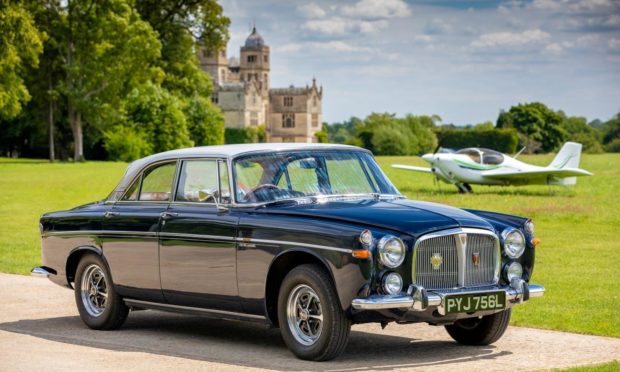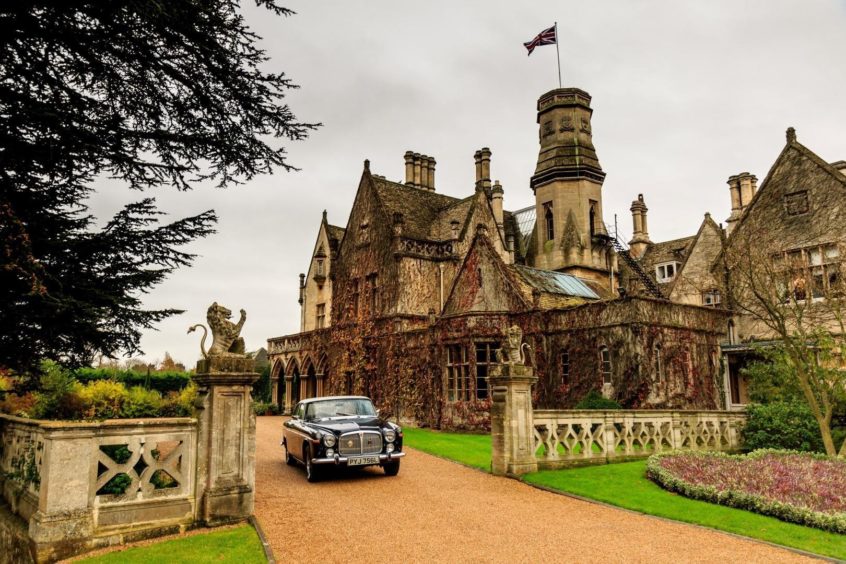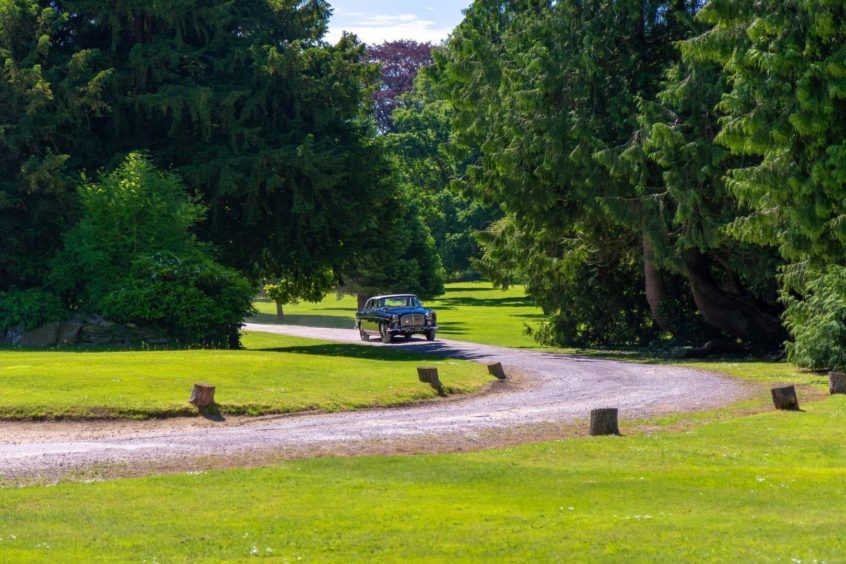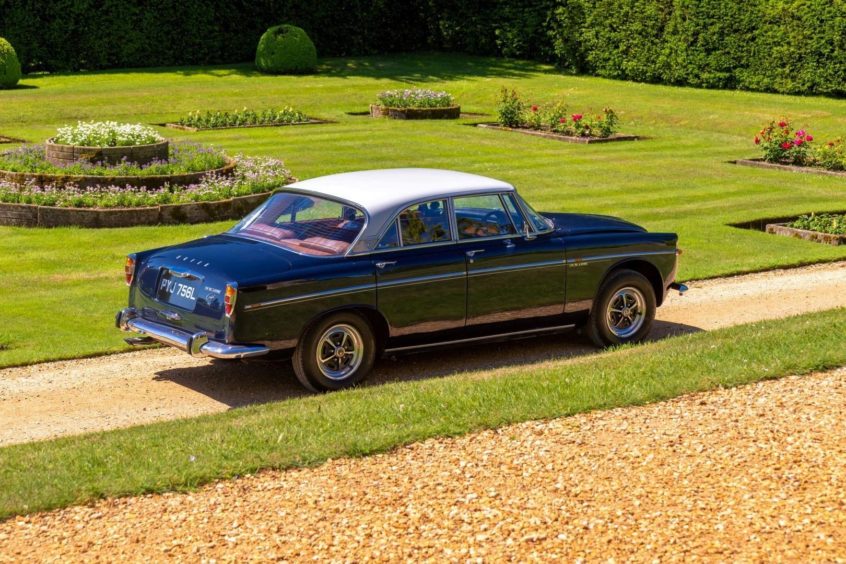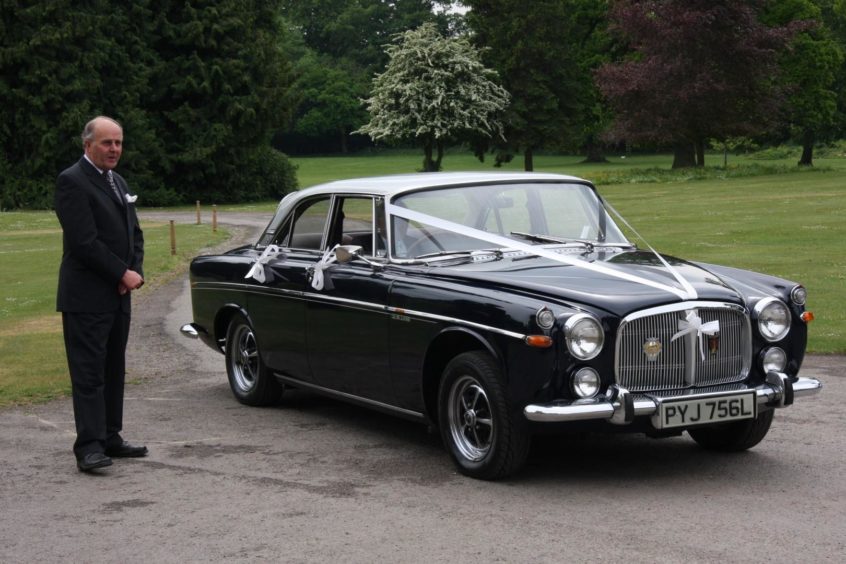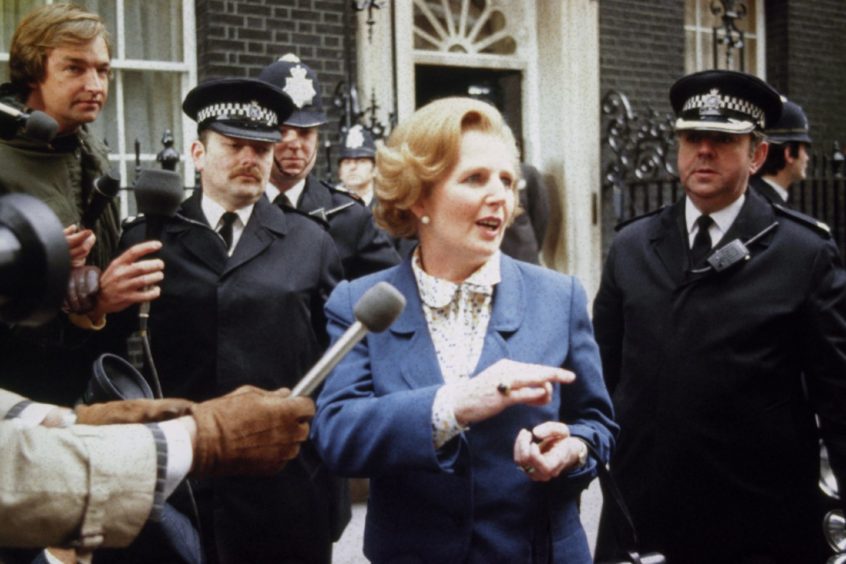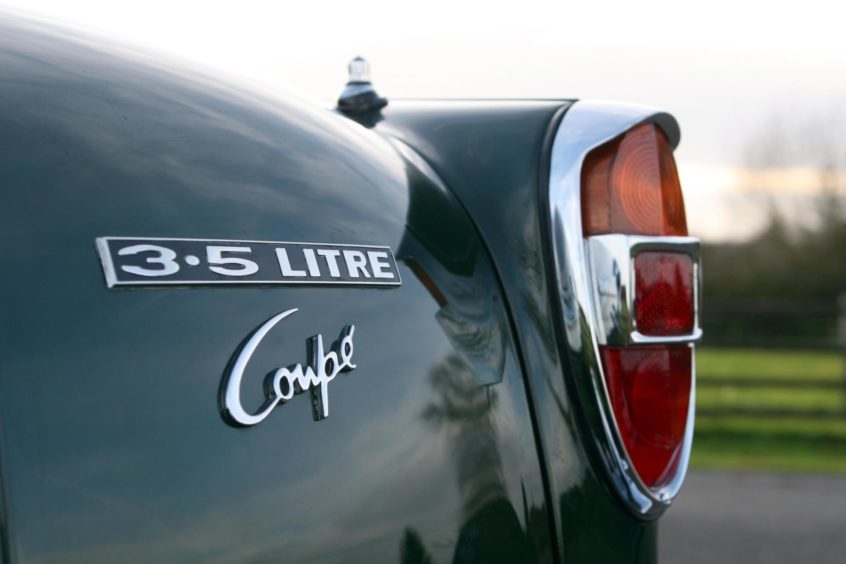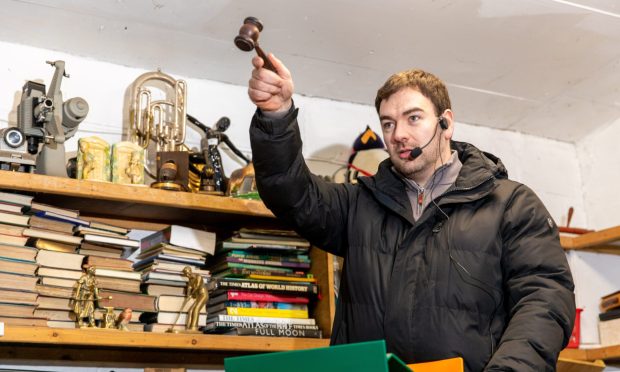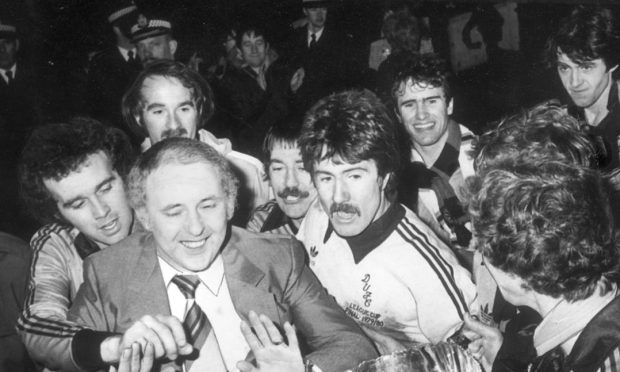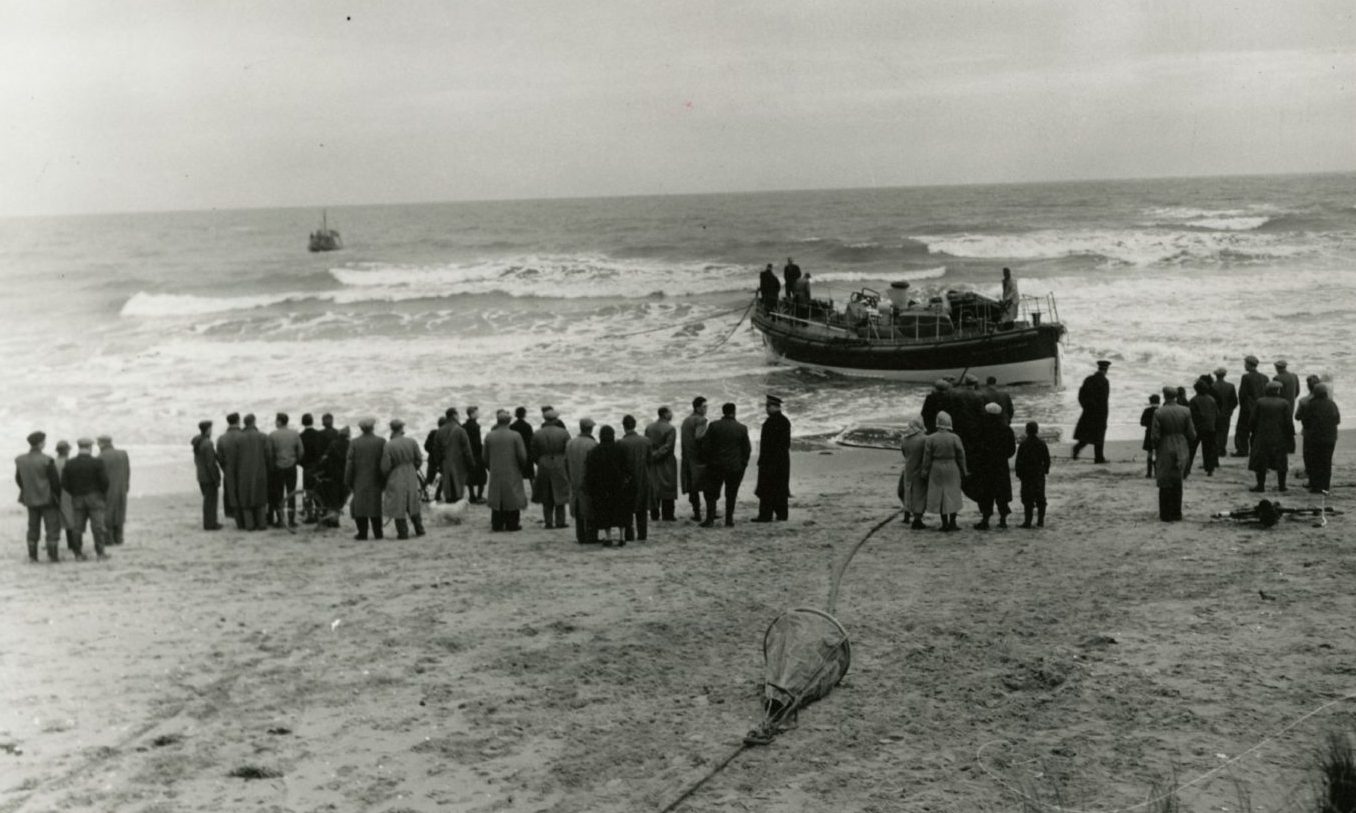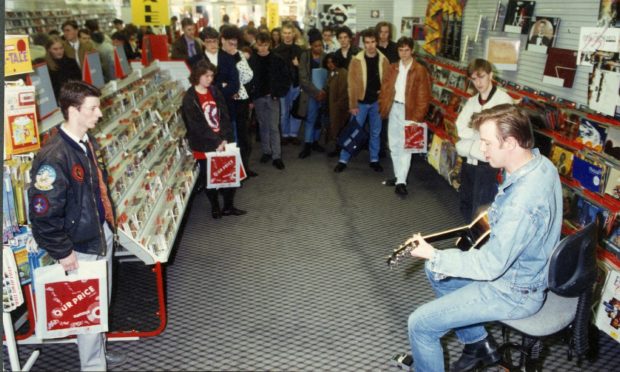The story of a classic car that spent its first 37 years in Dundee has been brought to life.
Martin Robins from Wiltshire purchased the blue Rover P5B Coupe in 2009 and has now worked with Mike Menzies from Dundee Museum of Transport to produce a new booklet and calendar which is a love letter to his pride and joy.
Royal favourite
An example of British style and flair, the Rover P5B was a luxury car of the era.
The Queen owned a couple which were powered by Buick-supplied aluminium Rover V8 engines.
Martin’s Rover P5B Coupe was originally purchased in September 1972 for £2,700 from Rossleigh’s showrooms in Nethergate by David Fairweather who ran a newspaper distribution company in Dundee.
Brian Clark, who worked at Rossleigh, carried out the pre-delivery check on the car.
He then opened his own business and continued to look after the car for the next 37 years for both Mr Fairweather and subsequently his son-in-law Sandy Yates following Mr Fairweather’s death in 1992.
Sandy had a Porsche 356 Coupe from Stuttgart and the Rover P5B spent much of its time in his garage although he did take part in a couple of Royal Scottish Automobile Club (RSAC) runs with fellow classic car enthusiasts.
Martin heard about the car through a third party and contacted Sandy to ask whether he would be prepared to sell it to him.
As Sandy used the car fairly infrequently he agreed to sell and Brian Clark provided a comprehensive inspection report of the car.
The report was satisfactory with very little work needing to be done because the Rover had been well looked after by its previous two owners.
Love affair
Martin said his love of the Rover goes back to 1968 when his father bought a new one and the rest is history.
“We have always thought of the car as a Dundee car and if there is a problem – there have been very few – we speak to Brian,” he said.
“The car bears a Dundee number plate and is on loan to us – we are merely guardians.
“The car is an absolute dream to drive.
“Interestingly it does not have a radio – this was an optional extra.
“It is quiet, comfortable in the extreme and yes we do like the admiring glances and comments!
“It stands apart from the crowd.
“A fine Rover P5B Coupe with low mileage and in the right colour commands three times the price of a Rolls-Royce of the same vintage.
“It is now the most desirable saloon car of its age.
“People who know more than me tell me that the P5B is a hugely underrated car but it was the vehicle for the Queen and four prime ministers.
“Margaret Thatcher arrived in Downing Street in her Rover six years after production stopped.
“Our car is used for high days and holidays and we have done less than 3,000 miles in the 11 years of our ownership.
“We are reliably advised that with regular maintenance the car will last many years.
“This model brought my father great pleasure and has done similar for both myself and my family.
“We feel hugely privileged to have owned a masterpiece of engineering.
“To have a vehicle still under the wing of the original pre-delivery inspection mechanic seems to me incredible.
“When we heard how cherished the car had been it seemed sensible to tell the story before Anno Domini took its toll.”
Wonderful testament
Martin got in touch with Dundee Museum of Transport and Mike Menzies worked with him to chart the history of the car and put together a booklet and calendar which he said is a “wonderful testament to a fine car”.
Martin said: “My father always said of his Rovers – they pass everything on the motorway except the petrol station!
“Meeting the owners and the mechanic at the car’s birthplace was quite emotional.
“Let us hope we are all here for the 50th birthday in September 2022.
“We are simply custodians of one of the finest cars ever made – hopefully the next generation will cherish the car as much as we do.
“The booklet is as much for them as anyone.”
The Rover is housed in Martin’s garage alongside a fully restored radiator grille from a Rover P4 which was owned by the grandson of Harry Smith who was the first managing director of Rover.
In his study there is also an illuminated address given to Mr Smith by his employees in November 1915.
Martin said: “Since I bought the Rover I’ve enjoyed driving it and have visited many picturesque locations.
“My regard for the Rover P5B Coupe is such that when an older 1971 version became available, I couldn’t resist buying it.
“This car is finished in Rover white with the roof in burnt grey.
“The car was in superb condition when I bought it and makes an ideal companion to the ‘Dundee Car’.
“I’ve always regarded the P5 together with the P6 and Land Rover as the last ‘real’ Rovers before all the mergers and takeovers took place.
“Rover exemplified the true values of British manufacturing producing refined, comfortable, reliable and traditional luxury cars.”
A Rover P5B identical to the Dundee Rover was sold on Saturday for £46,400 which is believed to be a record sum.
Margaret Thatcher used to have a power nap in her Rover P5B
Harold Wilson’s prime ministerial car, a Rover P5B Saloon, was fitted with a specially modified door armrest to accommodate his pipe and a box of matches.
Margaret Thatcher had a specially adapted rear headrest fitted to her Rover P5B so that she could rest her head and have a power nap.
The Queen’s Rover P5B Saloon was the very last off the production line, and was finished in a non-standard dark green.
This was her second P5B.
Her first P5 was a 3 litre saloon and this particular car was reputed to have been her favourite.
Reliable seal
Many prototypes of the P5 were constructed in the 1950s and the very earliest example featured frameless windows.
This was never adopted by Rover as they were unable to create a reliable seal.
There were many variants of the P5 saloon modified by various coachbuilders.
A very smart 3 litre convertible was built by the Swiss company Graber.
Another was built by FLM Panelcraft based on a P5 3 litre saloon.
Both these convertibles by Graber and FLM were one offs.
An unknown Irish coachbuilder even converted a P5B Coupe into a hearse.
Life and times of the Rover brand
Rover was founded in 1878 by John Kemp Starley and William Sutton and initially manufactured bicycles, motor cycles and later cars.
In 1905 the Rover Cycle Company became the Rover Company and produced a 3.5hp motor car.
Spencer Wilks arrived as general manager in 1929 and subsequently his younger brother Maurice in 1931.
Wide renown
Together they would transform Rover to a car manufacturer of wide renown.
Spencer became managing director in 1933 and moved the Rover product upmarket while Maurice looked after the technical side as director of engineering.
The man credited with styling the Rover P5 is David Bache who had arrived at its Solihull plant in 1953.
The Rover P5 saloon was unveiled at the 1958 Earls Court Motor Show, and was generally well received.
The P5 was the first Rover to use the legendary Rover V8 engine and transformed the P5 into the faster P5B.
The Rover P5B was introduced in the autumn of 1967 and the saloon version cost £1,999 while the Coupe was superb value for money at £2,097.
Motor magazine following a 1967 road test said the P5B was so well insulated from all sources of noise “that a Jeeves-like calm nearly always prevails” and even when the engine is at its most discreetly agitated “it emits nothing more than a purposeful hum”.
“Most of the time the engine merely whispers the car along with the proverbial turbine like smoothness characteristic of good V8’s.”
